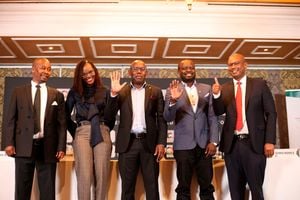
Football Kenya Federation president (FKF) Nick Mwendwa (right) confers with his vice president Doris Petra during a federation Special General Meeting in Nairobi on January 28, 2020.
The Football Kenya Federation (FKF) Electoral Board was unveiled on Monday and promptly declared it intended to hold the highly anticipated elections by December.
The board is chaired by Hesbon Owilla, with lawyer Marceline Sande the Secretary-General. Other members are former AFC Leopards chairman Dan Mule, communication consultant Alfred Ngang’a, and Sports Journalists Association of Kenya (Sjak) president James Waindi.
But will the delayed polls be held as schedule and in a smooth way? Early signs indicate that this may not be the case.
The polls were in fact originally planned for October, but court cases derailed the process. The terms for FKF branch officials ended on September 19 while those of the FKF National Executive Committee (NEC) end on October 17.
Even as the FKF Electoral Board embarks on its mandate, several parties interested in contesting are already challenging the process.
FKF presidential hopeful Tom Alila, has threatened that, together with other aspirants, they may file a petition in court if the board does not rescind its decision to base its headquarters at Kandanda House in Kasarani, Nairobi.
Murang’a Seal vice chairman Hussein Mohammed and former Kenya international Sammy ‘Kempes’ Owino, who have also expressed interest in the FKF top seat, have similarly raised concerns over the credibility of the polls if the board operates within the precincts of the federation.
Despite assuring Kenyans that they will be impartial, the board's move to operate from Kandanda House has cause jitters among several aspirants.
“I strongly object to the decision by the Electoral Board to have its office at Kandanda House. Honestly, how will they conduct free and fair elections when they are based where some of the people who have expressed interest to vie in the elections are operating from? It is like having IEBC (Independent Electoral and Boundaries Commission) operating at State House,” lamented the former Nyanza FKF boss.
Owino stated: “It (the Electoral Board being based at Kandanda house) validates our concerns that they are not independent but just an extension of the FKF.”
Mohammed in a statement on Monday said: “The FKF Electoral Board must demonstrate its independence by operating from a neutral location, entirely detached from Kandanda House. This is crucial to ensure the electoral process remains free from undue influence by current FKF officials, many of whom are also contenders.”
Owino has already shown his distrust of the FKF electoral process.
On September 7, he revealed he had filed a case before the Court of Arbitration for Sports (CAS) in Lausanne, Switzerland, praying to the court to compel Fifa to form a Normalisation Committee in the country to conduct the federation’s elections.
The former Kenya great took issue with the amendments that were made in the 2019/2020 Electoral Code during the SGM.
Delegates adopted proposals by Tusker’s chairman, Charles Gacheru, to have those who have been in active football for two of the last five years qualify to vie for the positions of FKF president, vice-president, NEC, and county and branch officials.
Before the adoption of the amendments, the Electoral Code stipulated that only those who had been active in football for three of the last four years were eligible to vie.
“The path initiated by FKF through the just concluded Special General Meeting (SGM) will not result in free, fair, and credible elections. Instead, it will lock out qualified individuals and clubs from participating despite the electoral code changes that were made. It will also result in continued litigation,” said Owino.
Seven football county associations have challenged the resolutions passed in the FKF Special General Meeting (SGM) held on August 24, including approving the electoral code and electoral board, at the High Court.
In the matter before Justice Olga Sewe at the High Court in Mombasa, the seven county football associations, led by the Nairobi County Football Association, argue that officials who convened the SGM led by FKF Chief Executive Officer Barry Otieno had no capacity to do so.
Goshi Juma of the Mombasa County Football Association pointed out that the resolutions were passed when a court order had been issued barring the said officials from acting on behalf of FKF.
He pointed out that the High Court had on May 10, 2022, ruled that the FKF NEC was duly removed from office and therefore lacked the capacity to act as officials of FKF.
The Sports Disputes Tribunal annulled the last FKF polls twice in 2019 and 2020 over legal and eligibility issues and then allowed the third election results to stand on conditions that the federation met the provisions of the 2013 Sports Act within 90 days.
The hallmarks of another disputed, litigated election are in place as history in the never ending troubles of Kenyan football management looks to repeat itself.






